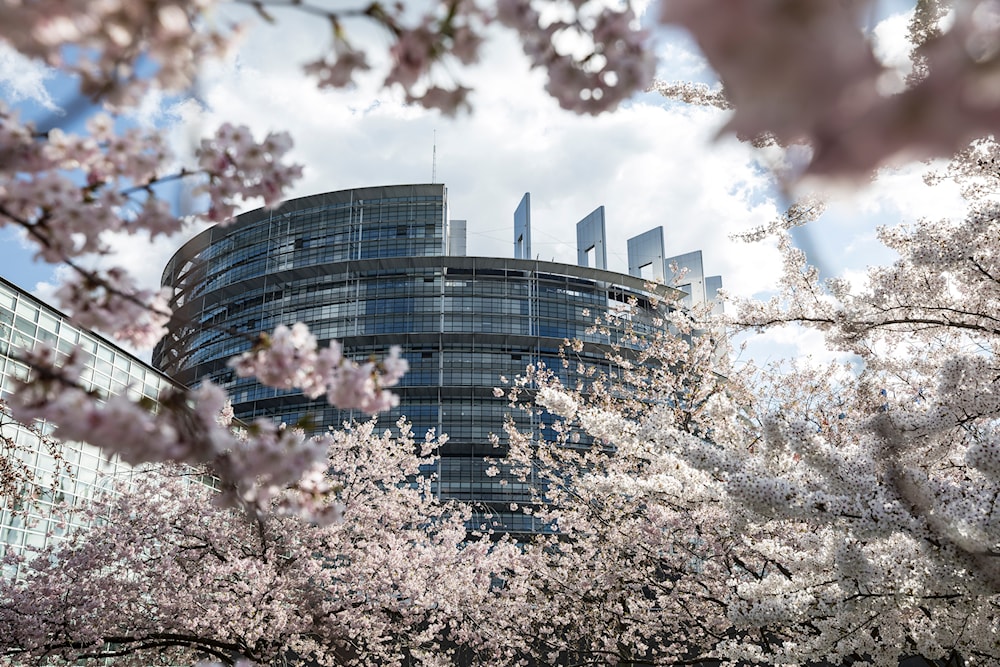Irish, Czechs hold EU vote after Dutch far-right gains
On the second day of the marathon EU elections, Irish voters took up the reins on Friday following the Dutch vote.
-

The European Parliament is pictured through cherry trees in Strasbourg, eastern France, on March 26, 2019. (AP)
On the second day of the EU elections marathon, Irish voters took center stage following the Netherlands' initial voting day, marked by significant gains for the far right.
Ireland's 37-year-old Prime Minister Simon Harris cast his vote near his residence in the village of Delgany, just south of Dublin, as polls opened at 7 am (0600 GMT). He then embarked on a rapid tour to rally support for local and European Parliament elections.
"I admire his energy, although I don't vote for his party," said Keith O'Reilly, a 41-year-old IT worker on his way out of the polling station.
"They're getting so many things wrong, the migration issue for one thing," he told AFP. For the first time in an Irish EU vote, many candidates are running on an anti-immigration platform, either as independents or for fringe nationalist parties.
Polls in the Czech Republic were scheduled to open later at 10:00 GMT, preceding Sunday's primary election day when the majority of the European Union's 27 nations, including influential countries like Germany and France, will participate in voting.
Czech Republic's low voter turnout
Czech politicians are encountering significant apathy toward the EU vote, following the country's second-lowest turnout in 2019 at 28.72 percent.
Polls indicate that the centrist ANO movement, led by former prime minister, billionaire Andrej Babis, is ahead of a center-right coalition. In a message to voters on Friday, Babis urged them to "remove the green fanatics and pro-migration enthusiasts who have taken root in the European Parliament."
Dutch far-right Wilder's PVV party defeated
Former European Commissioner Frans Timmermans defeated far-right leader Geert Wilders in the Dutch European Parliament elections, according to an exit poll released on Thursday.
The four-day election marathon across the 27 countries of the European Union has kicked off in The Netherlands, with France, Germany, and others voting on Sunday, as the bloc's 370 million voters are voting at a time of deep geopolitical uncertainty.
Timmermans' Green/Labour alliance was poised to gain eight seats in Thursday's election, ahead of Wilders and his PVV Freedom Party with seven, the definitive exit poll by national broadcaster NOS projected.
With a focus on environmental sustainability, the Greens/EFA group was said to garner widespread support among younger voters and progressive-minded individuals.
EU elections open in Netherlands
The four-day election marathon across the 27 countries of the European Union kicked off in The Netherlands, as the bloc's 370 million voters are voting at a time of deep geopolitical uncertainty.
The Netherlands is just one of the bulk of nations where nationalist and far-right parties are expected to prevail in the results, while the Freedom Party (PVV) of Geert Wilders, who won the national elections last November, is also expected to take another win.
The results of the polling could very much affect Brussels' approach to climate change, ties with the US and China, aid to Ukraine, EU development and memberships, and the integration of AI innovations.
Meanwhile, the votes count as a challenge for EU Commission chief Ursula von der Leyen, who is trying to run for a second term. Even if she does get votes, she would still need support from the parliament.

 4 Min Read
4 Min Read








